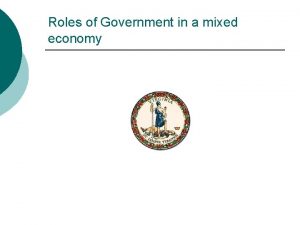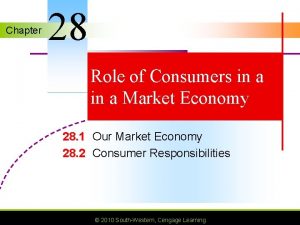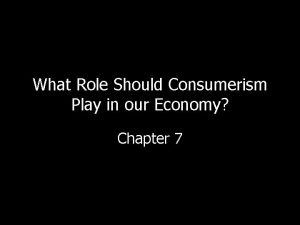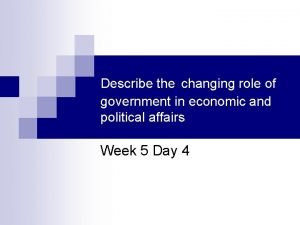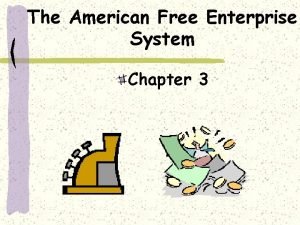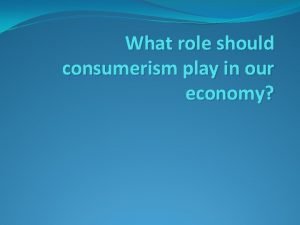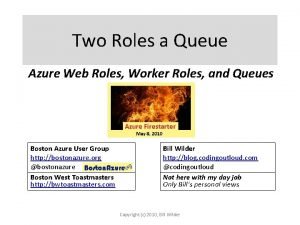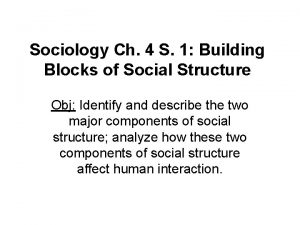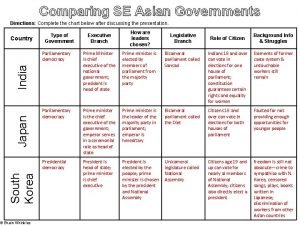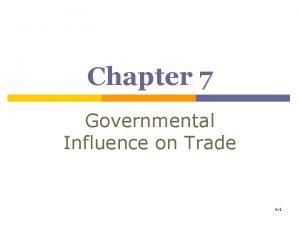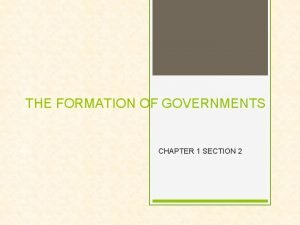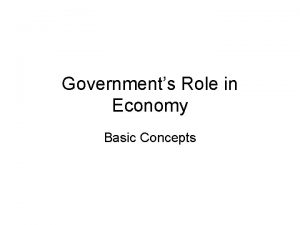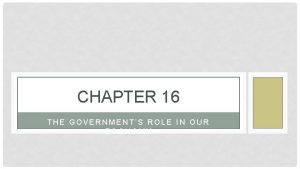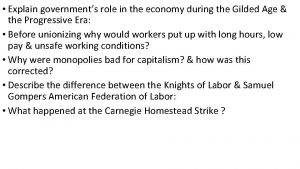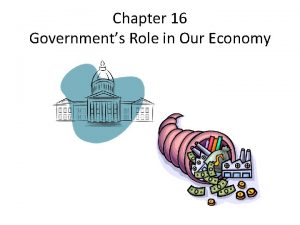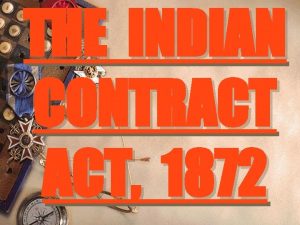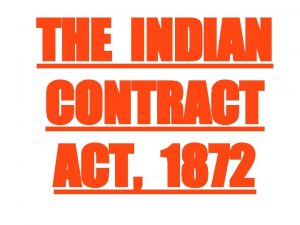4 Governments Role in the Economy The Offer

















- Slides: 17

4. Government’s Role in the Economy: The Offer You Can’t Refuse

Government and the Economy • Money may not make the world go ’round, but it is an important political concern. • Perhaps the collective security of economic investment is the reason humans created government in the first place.

Government and the Economy • People tend to hold the government responsible for maintaining and improving the economy. • However, the relationship between economics and politics is much more complex, subtle, and dynamic than many people understand.

The Tragedy of the Commons • The individually rational exploitation of shared resources to the detriment of the needs or interests of the community is known as the tragedy of the commons. • Even if people realize that everyone would benefit from preserving the shared resource (enlightened self-interest), individuals will overexploit the commons if they believe others will cheat or take advantage of the group. • Exploitation becomes the rational choice.

The Tragedy of the Commons • The solutions for the tragedy of the commons all involve collective actions. • Individuals must be compelled to act in the best interest of all, even at an individual cost to themselves. • Government policing and enforcement of laws make it rational for individuals to act in the collective best interest. • This allows groups to pursue goals that cannot be attained spontaneously and would be impossible for any one individual to realize.

The Tragedy of the Commons • To escape the tragedy of the commons, society uses government to control some of the means of production, the mechanisms for transforming labor into wealth. • At a basic level, capitalism and socialism are two perspectives on who should control the means of production: individuals or society.

Karl Marx—Student of Capitalism? • Any exploration of the government’s role in the economy must examine the ideas of Marx. • Marx has been widely vilified, but he made important observations about the transformation of feudalism to capitalism.

The Adolescence of Capitalism: Feudalism • Under feudalism, most production occurred within a peasant/landowner context. • The landowner controlled and owned the land, while the peasants raised crops and livestock on the landlord’s estate. • The peasants were obligated to give a substantial percentage of their production to the landlord. • While exploitative, this was a mutually dependent relationship.

The Adolescence of Capitalism: Capitalism • Under capitalism things were different. • Capitalists used factories as the means of production —that is, to transform labor into wealth. • Laborers became easily replicable cogs in the productive machinery. • Laborers no longer controlled the means of production.

Competition as the Driving Force in Capitalism • The driving force in capitalism is the competition between capitalists. • Constant competition drives an endless quest for greater and greater efficiency. • This requires capitalists to continually cut costs and demand more from workers. • Marx saw the massive overexploitation of workers as the fatal flaw of capitalism.

The Pool of Labor as a Common Resource • If we consider the pool of laborers as a commons, a shared resource that capitalists exploit for economic gain, the concept of the tragedy of the commons is applicable. • The constant push to lower salaries will eventually leave workers unable to buy the goods they produce.

The Pool of Labor as a Common Resource • Workers will eventually become so desperate they will see no alternative to destroying the system through revolution. • Capitalism provides no way for individual capitalists to end the overexploitation; generous capitalists would be overtaken by market forces.

I Thought You Said There’d Be a Revolution? • Why was there no revolution as Marx predicted? • The solution to this tragedy of the commons is, again, collective action. • Through government, individuals can be compelled to prevent the destruction of the commons through overexploitation.

I Thought You Said There’d Be a Revolution? • As worker dissatisfaction and unrest threatened to grow into revolt, capitalists turned to government. • At first force was used, but there is a limit to the effectiveness of force. • Governments gradually adopted policies that gave the workers some of what they demanded, including limitations on the exploitation of labor.

Socialism • Marx categorized political economic systems according to who controlled the means of production. • The means of production are things necessary to transform labor into wealth. • Under the feudal system, craftsmen controlled their means of production. • Land was the primary means of production, which was controlled by the church along with a hereditary elite. • In a capitalist system, individuals control the means of production. • Socialism is an economic system in which society controls the means of production.

Socialism • Pure socialism, just like pure capitalism, cannot work in practice. • Socialism is very good at distributing goods but very inefficient at producing those goods. • In his descriptions of socialism, Marx undervalued the role of human motivation. • Socialism is very inefficient because it undervalues the ability to motivate people to work harder, seek efficiencies, or excel at their craft.

The Ying and Yang of Capitalism and Socialism • All of today’s functioning capitalist systems are mixtures of capitalism and socialism. • Think of the things government does to regulate the marketplace. • When government regulates businesses and polices the exploitation of labor, it uses principles of socialism to save capitalism. • The real question is not capitalism versus socialism, but what balance between the two systems is best.
 Sip early offer vs delayed offer
Sip early offer vs delayed offer Athens and sparta were both
Athens and sparta were both 3 roles of government in a mixed economy
3 roles of government in a mixed economy Rights of a trade union
Rights of a trade union Chapter 28 role of consumers in a market economy
Chapter 28 role of consumers in a market economy What role should consumerism play in our economy
What role should consumerism play in our economy Changing role of government in the economy
Changing role of government in the economy How are conflicts among economic goals resolved
How are conflicts among economic goals resolved What role should consumerism play in our economy
What role should consumerism play in our economy Worker role azure
Worker role azure Rollenmodell
Rollenmodell Statuses and their related roles determine
Statuses and their related roles determine Are local governments tax exempt
Are local governments tax exempt Comparing se asian governments
Comparing se asian governments Why do governments intervene in international trade
Why do governments intervene in international trade The formation of governments 1-2
The formation of governments 1-2 How do the governments of kenya and nigeria compare?
How do the governments of kenya and nigeria compare? Centre region council of governments
Centre region council of governments


